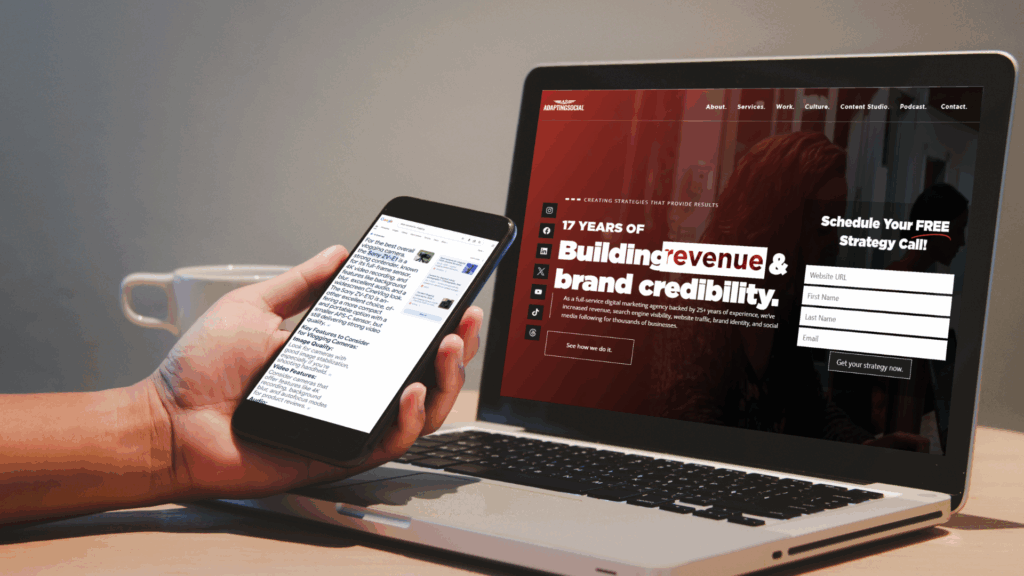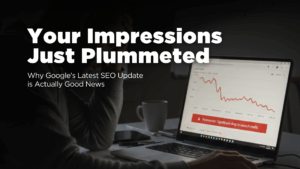If you think SEO is all about ranking on Google, think again. In 2025, the game is changing—and fast.
Generative AI tools like ChatGPT, Google’s Search Generative Experience (SGE), and Bing Chat are no longer just novelties. They’re becoming digital gatekeepers, reshaping how people discover businesses, research services, and make buying decisions. Whether someone’s asking ChatGPT for the best marketing agency in New Jersey or using Google SGE to compare HVAC companies in their area, AI is shaping what they see—and what they don’t.
That’s why ranking on generative AI isn’t just a nice-to-have anymore. It’s a critical part of staying visible, competitive, and trusted in a rapidly evolving digital landscape.
In this blog, we’ll break down:
- What “ranking on generative AI” actually means
- Why it should matter to you as a business owner
- The risks of being invisible in AI-powered search tools
- How to show up in ChatGPT, Bing, and SGE recommendations
- Actionable strategies you can implement today—both nationally and locally
Let’s explore how your business can stay one step ahead in the age of AI search.
What Does It Mean to Rank on Generative AI?
Ranking on generative AI isn’t the same as showing up on page one of Google—it’s about being named directly in AI-generated responses when users ask questions like, “Which meal delivery service is best for clean eating?” or “What’s the most trusted personal injury law firm in New Jersey?”
Tools like ChatGPT, Bing Chat, and Google’s SGE are trained on massive datasets and real-time web content to deliver direct answers instead of links. In many cases, these platforms summarize options or recommend businesses outright—without ever sending users to a traditional search engine results page.
The shift is already happening:
- ChatGPT can pull in real-time web results via plugins or browsing tools and give brand-specific suggestions.
- Bing is integrating AI answers above traditional links.
- Google’s SGE can provide link-less AI snapshots that address a user’s question immediately—meaning fewer clicks to your website unless you’re part of the answer.
And yes—people are already using these tools to find what they need. Ranking on generative AI means your business gets named. If you’re not in the answer, you’re out of the conversation.
Why Ranking on Generative AI Is Important for Businesses
Let’s get straight to it: if your business isn’t showing up in AI-generated answers, it’s losing visibility. And with less visibility comes fewer clicks, fewer leads, and fewer sales.
The way people search is shifting. When someone types a question into Google today, they might be met with an AI-generated summary at the top of the page. That summary might answer their question completely—without ever showing your website. In fact, Google’s own tests have shown that users are clicking fewer traditional links when these AI snapshots appear.
And it’s not just Google. Tools like ChatGPT and Bing Chat can deliver direct recommendations based on what they’ve learned from across the internet. If your competitor has more online reviews, stronger content, and more mentions, they’re more likely to be included in those recommendations.
Studies are already reporting the fallout. After the rollout of Google’s AI-driven search experience, some businesses saw their organic traffic drop by as much as 60%. These aren’t small changes—they’re traffic swings that impact revenue.

What Influences AI Recommendations?
Generative AI doesn’t guess. It pulls from the content, signals, and reputation your business has built across the web. If your name is showing up when someone asks ChatGPT or Google SGE for recommendations, it’s because the system has data to support that answer.
So what does it look for?
1. Brand Mentions Across the Web
AI tools prioritize businesses that are talked about frequently—and in the right places. If your name appears in news stories, blog posts, social content, or industry websites, it signals that your business is recognized and part of the conversation.
These mentions don’t always need to include links. Even unlinked brand references across reputable platforms can influence how AI models perceive your presence and relevance in your field.
2. Reviews and Reputation
Customer reviews are one of the strongest indicators of trust. Generative AI pulls in sentiment from review platforms like Google, Yelp, and Facebook to determine which businesses are recommended for phrases like “most trusted” or “best rated.”
A consistent stream of high-quality reviews—not just quantity, but detail and recency—helps AI engines associate your business with quality and reliability.
3. Website Authority and Backlinks
Search engines have long relied on backlinks from other sites as a sign of credibility—and generative AI models do the same. When authoritative domains link to your website, it signals that your content and services are trustworthy.
Your domain’s age, security, and technical setup also factor into perceived authority. In short, a solid SEO foundation still matters—especially when AI is scanning the web for sources to cite.
4. Content Relevancy
AI looks for content that directly answers real-world questions. Blogs, FAQs, service pages, and articles that use clear, specific language to address common search queries are more likely to be pulled into generative responses.
This is where clarity and originality matter. If your content is generic or vague, it’s less likely to be selected. But if your pages explain, clarify, or guide users through a topic in plain terms, that adds real value—and AI picks up on it.
5. Online Consistency
Longstanding businesses often have more digital history and citations online. That longevity builds a track record AI can recognize. But just as important is consistency—your business name, address, and contact info should match across all directories and platforms.
Discrepancies in your listings (say, a different phone number on Yelp vs. Google) can confuse AI and reduce your perceived legitimacy.
6. Third-Party Recommendations
Mentions from influencers, local media, blogs, or niche publications carry serious weight. These third-party validations help position your business as credible, especially when they’re coming from voices that matter in your industry or region.
Even informal recommendations—like being listed in a “Top 5” blog or a podcast shoutout—can strengthen your AI footprint.
How to Get Generative AI Recommend You in Its Responses
If you want your company to be mentioned in AI-generated answers in 2025, you’ll need to go beyond traditional SEO and focus on credibility, clarity, and visibility across the web.
Here’s how to do that:
1. Focus on Answer Engine Optimization (AEO)
Start creating content that directly answers specific questions in your industry. This includes blog posts, FAQs, and service pages that clearly address common customer queries. Use question-style headings like “What does a social media agency actually do?” or “How often should I update my business website?”
AI models are designed to scan for relevant, concise answers. Structuring your content this way makes it more likely to be pulled into a response by ChatGPT, Bing, or Google SGE.
2. Publish High-Quality, Expert-Driven Content
AI-generated content is everywhere—and most of it is shallow. That’s exactly why real expertise stands out. If you write articles, case studies, or guides based on your actual experience, you’re giving AI something original to work with.
Include real examples, data, or insight from your work. Share what worked, what didn’t, and what businesses should avoid. These specifics add weight to your content and increase the chances it gets cited by an AI model.
3. Build Brand Visibility Through External Channels
Get your business mentioned on platforms outside of your own website. That could mean guest blogs, media placements, podcast interviews, or features in online publications. The more credible sites that talk about your business, the more likely AI is to connect your name with authority.
This isn’t just PR—it’s an SEO and AI visibility strategy. These mentions help build the digital footprint that machines use to assess your brand.
4. Earn Backlinks From Reputable Sources
Links from high-authority websites are still one of the most effective ways to signal trust. Whether it’s a citation in a news article or a link from a niche industry blog, these referrals help boost your credibility.
Even a few strong backlinks can raise your visibility across traditional and AI-driven search results.
5. Monitor Your Content Performance and AI Presence
Check how your content is performing—and go a step further by testing your visibility in AI tools. Ask ChatGPT questions your customers might ask and see if your business is mentioned. Do the same with Google’s SGE and Bing Chat.
If you’re not showing up, dig into why. Is your content outdated? Are competitors getting mentioned more frequently? Use analytics to adjust your content and strategy based on what AI is actually surfacing.
Local SEO Still Matters
Generative AI may be global, but it doesn’t ignore geography. When someone asks, “Who’s the best personal injury lawyer in Monmouth County?” or “Where can I get healthy meal prep in Central Jersey?”, AI pulls from local signals—just like traditional search engines do.
So while national authority helps, your local footprint still plays a big role in whether or not AI recommends you.
1. Keep Your Google Business Profile Updated
This is still the foundation of local search visibility. Make sure your Google business profile is accurate, complete, and consistently active. Post updates, add photos, respond to reviews, and make sure your hours, address, and contact details are correct. AI platforms often reference Google listings when generating localized responses.
2. Use Geo-Specific Keywords on Your Website
Don’t just say you’re a catering company—say you’re a catering company serving Middlesex County or Jersey Shore events. Use city and county names naturally throughout your site content, blog posts, and headlines. This helps AI understand where your business operates and who it’s relevant to.
3. Encourage Reviews Across Multiple Platforms
Google reviews carry weight—but so do Yelp, Facebook, and industry-specific sites. A consistent stream of recent, positive reviews builds local credibility and gives AI engines more data points when evaluating which businesses are trusted in a specific area.
4. Get Listed in Local Directories and Regional Publications
Make sure your business is present on directories like Yelp, Better Business Bureau, and any local business chambers or news outlets. These citations increase your online footprint—and they’re exactly the kind of third-party mentions that AI models look for.
5. Publish Location-Based Content
Create blog posts, landing pages, or case studies that are specific to your area. For example, a restaurant might write about the best spots for outdoor dining in Hoboken, or a wellness brand could highlight their impact on Bergen County clients. This type of content increases your relevance to AI queries with local intent.

The Future of Search Is Generative AI
Search isn’t just changing—it’s already changed. AI tools are now front and center in how people gather information, weigh options, and make decisions. And they’re not just pulling links—they’re producing answers. If your business isn’t showing up in those answers, you’re losing opportunities before a user even reaches the search results.
If your business isn’t appearing in AI-generated answers, it’s time to change that.
Adapting Social helps brands across the country—and right here in New Jersey—build the kind of presence that gets noticed by people and platforms. Whether you need stronger content, more brand visibility, or a smarter SEO strategy that includes AI, we’re here to get you in front of your customers before your competitors do.
Book a strategy session with our team to find out where your business stands and what it’ll take to show up in ChatGPT, Google SGE, and beyond. We’ll even run an AI visibility audit to see if your brand is being mentioned—and what to fix if it’s not.
Let’s make your business the answer people find—no matter how they search.




